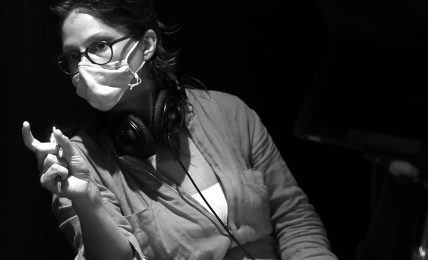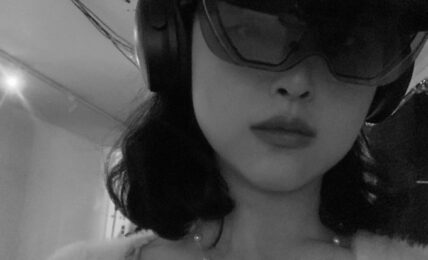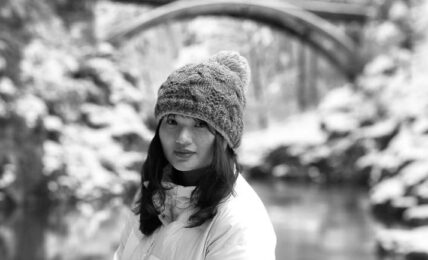Digital America interviewed Vi Trinh in November 2022 about her new piece Cyber Soldiers in Cyber Houses (2022).
:::
Digital America: How did being a part of Digital America shape your experience at the University of Richmond? Do any highlights/memories from that time stand out?
Vi Trinh: I was part of Digital America for issues 11, 12, and 13 during my junior and senior year of college. Digital America came at a time when I was starting to transition from the abstract learning I was doing in my other classes to the concrete application of that learning. All the reading and writing I had been doing had led to something. The material of the class was WACKY and weird which I mean in the most loving way. Many of my classes at the time skewed toward the median of interests. The middle ground between extremes but Digital America and learning about Internet art really pushed us to embrace the margins, the hyper-specific, and the abstract. While your time in school is set to drive you toward mechanical understanding, Digital America lets you embrace absurd ambiguity. I remember my seniors asked me to join Digital America for the first time. At the time nobody knew anything about the class so it was a bit like joining a secret club. The most memorable experience was probably the -we didn’t start the fire parody video- from issue 11. It was so much fun to write and film. It was also a really wonderful snapshot of the team at the time, I still talk to a few of them today. I had Claire do some voice acting for me in Atlantis one of my recent projects.
DigA: Did you take anything with you from your time on the journal that has since shaped your work?
VT: I think my entire practice is built upon the foundation of Digital America. Until senior year my art practice focused almost entirely on painting. But for my thesis senior year I did a 180 kickflip backspin into making online narrative video games about post-apocalypses because I needed a place to put all the thoughts that had come out of my DIGA learning. I mostly make interactive internet pieces even now almost like journaling or thought experiments. The way I research for my practice and what I am concerned with circles back to my time in Digital America, the Internet, information accessibility, and structural foundations of technology intersecting with other social topics. The style with which I critique artwork is similarly built upon those submission reviews we did for the magazine. I owe a lot to Digital America and Meghan for shaping me today.
DigA: You wrote and contributed to other pieces for Digital America during your time as a student such as The Station, Escape and Thank You. As you look back on those pieces, do you see any of them differently?
VT: One of the best ways to tell if you’ve grown as an artist/person is to be able to look back and be a little embarrassed about the work you’ve done in the past. It means I can do better now, so like any perfectionist I look back and see things I want to fix and change. However, I also see the beginnings of my current trajectory. When I made those pieces I didn’t know where it was going or what I was doing. I very much made them in the moment and for Escape, I thought it would be a one-off piece I would never go back to. It was a piece without a lot of skill but a lot of effort. I think it’s still the purest expression of what I was thinking at the time. It’s nice to see that I was brave enough to jump into new waters without knowing anything. Writing for Digital America I remember struggling so much with the art speak. Now, it’s much easier to manage, but just remembering the frustration makes me really grateful I was able to learn from trial and error. It really forced me to sit down and learn how to write about art, and now I even get compliments about it despite being so terrible in the beginning.
DigA: Your new work, “Cyber Soldiers in Cyber Houses” is a play on the game I-Spy that questions the definition of occupation in the age of surveillance technologies. What inspired this piece? For those who have played, what feedback have you received from their experiences?
VT: Cyber Soldiers in Cyber Houses was a piece commissioned for Shall Make Shall Be: the bill of rights at play by the Frank Ratchye STUDIO of Creative Inquiry. My piece is inspired by the third amendment, “No Soldier shall, in time of peace be quartered in any house, without the consent of the Owner, nor in time of war, but in a manner to be prescribed by law.” In our digital age what does war, consent, soldier, and house mean? How do we apply old laws to current values? The US military currently engages in cyber warfare/defense however the Internet and data are not bound by country borders so how do you create concrete laws and legislation around an amorphous evolving entity? I think current events have shown how powerful data is as a tool or as a weapon and how unequipped lawmakers are to legislate it. At the time of making it we were in the last year of the Trump presidency so the internet and the breakdown of the foundations of our democracy were at the forefront of everyone’s minds. Video games and games in general especially as art have an unprecedented ability to engage the viewer and allows for non-linear storytelling. Video games like laws are built structures created with intention, in which there are incentives and punishments for players to act within. It was fun to make a piece that tied all these thoughts and questions together in a format that allowed them to be explored to the fullest.
The feedback from players has been very interesting to listen to. I try to build multiple layers of interaction for players with differing engagement levels so I was surprised how many people were obsessed with getting perfect scores. What was so different between people was how much they paid attention to the droning narration. Some completely ignored it, some listened intently, and some let it fade before it reasserted itself into their consciousness. People have told me it’s a fun frustration playing an i-spy game with a timer while being pestered by narration. The increased visual noise made it increasingly difficult with each level. Conceptually I believe many people understood the base mechanic of finding bugs inside their home and connecting it to cyber surveillance, although the rest of the content might only transmit in pieces and parts, that too was intended as the game serves as an example of our current attention economy. The best part was watching people work together to finish the game, it was a happy surprise to see people helping each other find bugs. I somehow always forget as an artist that no matter how much you plan out your pieces people will surprise you in wonderful ways.
DigA: What are your thoughts/views on the surge of “smart” home technology? What do you think the future may hold in regards to technological advancements in the home?
VT: I’ve always viewed technology and technological advancements as tools that are subjected to the biases of their creators and users. In Helen Nissenbaum’s article “Technology, Autonomy, and Manipulation” she asserts that with proper protections having all the smart technology you want would be safe and perfectly private as well as enhance your quality of life. The problem of course is data and big data, in general, is sold in an opaque system that we, the products, have no access to or control over. She asserts that you shouldn’t have to protect yourself, your privacy should be assured under regulation. Such security would increase trust in the system and provide better data for improvements, scientific studies, etc. In the same way patient privilege allows you to trust a doctor. Currently, the problem with big data outlined by Richards and King is that big data is opaque, threatens to identify people and force them into boxed identities through the algorithm, as well as a way for power to continue to accumulate for the powerful, those who have access to big data are already powerful and big data only gives them more power. It’s hard to say what will happen in the future. I think the question with smart technology is how much are we willing to give up for convenience. I think it’s too late to get rid of smart technology so the answer is to move forward with increased understanding, transparency, and safety measures. I’m hoping with all the recent focus on the harm unchecked data harvesting can do that there will be more accountability. I think eventually the Internet and many current technologies will eventually become infrastructure and have OSHA codes, municipal inspections, and budgetary meetings as public goods, not without a fight of course but the hope is that one day big data and the Internet will be as “boring” as highways.
DigA: In your past works along with your present works, you have a theme of using futuristic/sci-fi narratives. What about these narratives appeals to you as an artist?
VT: Futurism and Sci-fi allow you to amplify current issues to the extreme in order to increase clarity and understanding. It’s also very liberating to be able to create narrative in the future and in fiction that means you can indulge in as much conjecture as is effective for your concept. Sci-fi literature is often concerned with political/social issues and using that same language is a shortcut to communicating with the viewers the concerns of the piece. I also admire how sci-fi often talks about technology, as a factor and product of society rather than something separate. When I am initially forming the concerns of projects I am always looking for the “angle” the thing that is interesting, intriguing, or new, therefore I never want to stop at what has already happened, or what is currently happening, I always want to push forward to what will happen. This urge often lands me in futuristic sci-fi. Most of all futuristic narratives ask questions. I want to ask interesting questions. As I find new answers I want to ask new questions.
:::
Checkout Vi’s contributions to Digital America over the years.
:::

Vi Trinh is a Vietnamese American artist currently based in London, UK. She graduated from the University of Richmond in 2019 and is currently a MFA student at Goldsmiths University of London.



